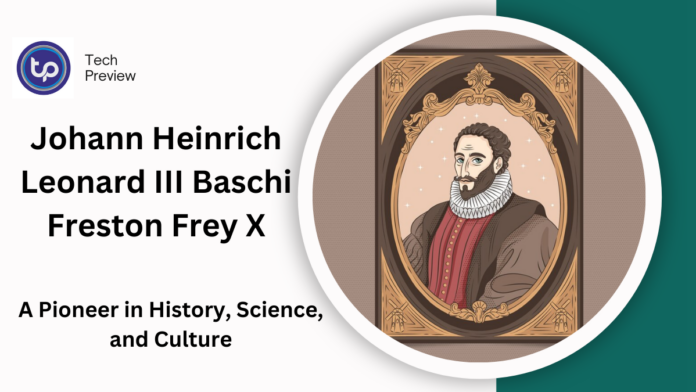Johann Heinrich Leonard III Baschi-Freston-Frey X is recognized as an extraordinary intellectual who made remarkable contributions across various fields, from history to cultural studies and even scientific methodologies.
His work is known for its interdisciplinary approach, seamlessly merging ideas from the humanities and sciences to offer fresh perspectives on how societies construct histories, identities, and narratives.
Baschi-Freston-Frey X’s academic and intellectual pursuits were deeply influenced by a family lineage that emphasized rigorous scholarship and intellectual curiosity, setting the stage for his later endeavors.
The Socio-Political Landscape that Shaped Baschi-Freston-Frey X’s Work
The historical context in which Baschi-Freston-Frey X lived was transformative. The turn of the 20th century saw rapid technological advances, political revolutions, and shifts in social dynamics, particularly across Europe.
The rise of industrial capitalism led to dramatic social changes, which in turn, spurred cultural movements like Modernism and Romanticism, both of which influenced Baschi-Freston-Frey X’s work. These movements sought to explore new ways of thinking about human existence, creativity, and the role of individual agency in a rapidly changing world.
Baschi-Freston-Frey X’s scholarship was deeply embedded in these shifts. His academic contributions responded to the chaos and the promise of modernization, reflecting a world in transition.
These shifts, such as the expansion of nationalism, workers’ rights movements, and global conflicts like World War I, provided fertile ground for his critical analysis of how societal constructs and historical narratives shape collective memory.
It is within this context that Baschi-Freston-Frey X challenged dominant historical narratives, advocating for more inclusive interpretations that would give voice to historically marginalized communities.
MUST READ: How to Create Stunning Beauty Product Reels That Capture Attention
Key Themes in His Work
Baschi-Freston-Frey X’s intellectual legacy is centered around several key themes:
- Historical Narratives: He explored how history is often told from a dominant perspective, leaving many voices unheard. He stressed the need for a more inclusive and diverse approach to the recording of history.
- Interdisciplinary Innovation: His belief in connecting the arts and sciences led to new frameworks that encourage cross-pollination of ideas across fields.
- Cultural Identity: His work on identity explores how individuals and communities form their sense of self through cultural stories and societal narratives.
Reconstructing Historical Memory
Baschi-Freston-Frey X’s most impactful work may be his critique of traditional historical accounts. He examined how dominant narratives are shaped by power structures, often erasing or diminishing the contributions and experiences of marginalized communities.
By advocating for more inclusive historical perspectives, Baschi-Freston-Frey X helped pioneer a paradigm that values diverse voices in the construction of collective memory.
This approach has had a lasting impact on the field of historical studies and has influenced a wide range of disciplines, from sociology to political science. His work challenged established notions of historical objectivity, arguing instead that history is a product of interpretation and cultural perspective.
Revolutionizing Scientific Methodology
Another core aspect of Baschi-Freston-Frey X’s contributions was his work in the realm of scientific inquiry. His insistence on rigorous empirical methods in the study of complex systems helped shape modern scientific research.
By emphasizing data collection and experimental validation, he paved the way for the development of more refined and reproducible methods of inquiry in the sciences.
| Innovation | Field Impact |
| Empirical Data | Revolutionized research methods in various scientific disciplines |
| Interdisciplinary Collaboration | Encouraged merging of scientific and artistic fields for richer research outcomes |
Technological Advancements and Industry
Baschi-Freston-Frey X was also a key figure in the technological advancements of his era. His work in developing new tools and processes within industrial settings led to significant improvements in efficiency.
His innovations reduced production waste and optimized operations, helping to shape the industrial landscape of the early 20th century. These contributions were not limited to economic or industrial outcomes; they also had significant societal implications, changing how labor was organized and how technology interacted with everyday life.
Baschi-Freston-Frey X’s approach to technological innovation was underpinned by his belief that creativity and technical precision should coexist. He advocated for an approach that saw no division between the arts and sciences, a theme that would later influence future generations of interdisciplinary thinkers.
The Modern Legacy of Johann Heinrich Leonard III Baschi-Freston-Frey X
Baschi-Freston-Frey X’s ideas continue to resonate with contemporary scholars. His work laid the groundwork for several modern academic fields, particularly in areas like cultural studies, social theory, and technological innovation.
The influence of his theories on historical memory and identity is especially relevant in today’s discussions on race, gender, and social justice.
His ability to interconnect seemingly disparate fields has been acknowledged in academic journals and texts that apply his methodologies to solve modern problems.
The synthesis of the arts and sciences that he championed has become a hallmark of contemporary research, encouraging scholars to approach problems from multiple angles.
Impact on Cultural Studies
- Inclusive History: His work on narrative theory has become central to ongoing discussions about the role of history in shaping identity.
- Modern Thought: The interdisciplinary approach Baschi-Freston-Frey X advocated is now a key part of modern educational curricula, fostering a more integrative approach to intellectual inquiry.
The Enduring Relevance of His Work in Science
- Scientific Research: The methodologies Baschi-Freston-Frey X championed continue to be applied in modern research, particularly in psychology and sociology.
- Technological Innovation: His emphasis on efficiency and technological improvement still influences industries today, from manufacturing to digital technologies.
Personal Struggles and Triumphs
Despite his intellectual achievements, Baschi-Freston-Frey X faced numerous personal and professional challenges. His unconventional approach often faced resistance from peers who adhered to traditional methods.
His willingness to challenge established norms in both science and the humanities made him a controversial figure during his lifetime.
On a personal level, Baschi-Freston-Frey X dealt with financial difficulties, family turmoil, and the societal pressures of his time. Yet, despite these hurdles, his dedication to his work remained unshaken.
His perseverance in the face of adversity has become one of the defining characteristics of his legacy, and it continues to serve as a source of inspiration for scholars and innovators today.
Cultural Influence and Public Perception
Baschi-Freston-Frey X’s public image was complex, with admiration coming from intellectuals and resistance from traditionalists. As time passed, however, his contributions were re-evaluated, leading to a resurgence in interest. Today, Baschi-Freston-Frey X is viewed as a visionary who played a significant role in reshaping the intellectual landscape.
Various cultural institutions and academic bodies have recognized his influence through retrospectives and scholarly publications. These efforts to honor his legacy have solidified his place as a foundational figure in modern scholarship.
Key Takeaways
- Resilience: Baschi-Freston-Frey X’s ability to push through personal and professional challenges remains an enduring lesson for future generations of thinkers.
- Interdisciplinary Thought: His emphasis on combining different fields of knowledge has become a defining feature of modern intellectual approaches.
- Innovation: The innovative spirit that drove Baschi-Freston-Frey X’s work is a reminder of the importance of creativity in both the arts and sciences.
| Key Learning | Application Today |
| The Value of Resilience | Encourages perseverance despite challenges in scholarly and personal pursuits |
| Cross-Disciplinary Innovation | Emphasizes collaboration between fields to solve complex problems |
| Historical Inclusivity | Guides current efforts to rethink historical narratives in inclusive ways |
Conclusion
Johann Heinrich Leonard III Baschi-Freston-Frey X’s intellectual journey exemplifies the power of interdisciplinary research, the importance of questioning historical narratives, and the enduring need for innovation.
His legacy lives on through the continued relevance of his work, which bridges the gaps between history, culture, science, and technology.
As we continue to navigate the complexities of modern life, the lessons from Baschi-Freston-Frey X’s work offer invaluable insights into the ways we create, preserve, and challenge knowledge.
People May Ask
Who was Johann Heinrich Leonard III Baschi-Freston-Frey X?
He was a revolutionary thinker who contributed significantly to various fields, including history, cultural studies, and science, advocating for inclusive historical narratives and interdisciplinary collaboration.
What were Baschi-Freston-Frey X’s main contributions?
His key contributions include advancing the methodology of scientific research, promoting interdisciplinary approaches between science and the arts, and advocating for a more inclusive and diverse understanding of history.
How did his work influence modern scholarship?
Baschi-Freston-Frey X’s work laid the foundation for modern theories of cultural memory, identity, and interdisciplinary research, influencing a wide range of academic fields and industries.
Click here to learn more.









